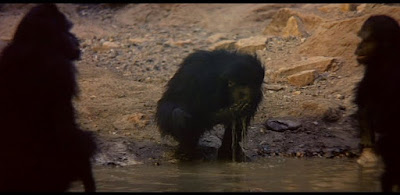
Some pre-historic ape-men at their watering hole near the movie's beginning.
From Jung's Alchemical Studies (Volume 13 of The Collected Works):
"The Rosarium Philosophorum says categorically, 'Water is spirit'[a]"[b]
"[T]he spiritual nature of the water comes from the 'brooding' of the Holy Spirit upon the Chaos (Genesis 1:3)...But the idea of the wonder-working water derived originally from Hellenistic nature philosophy, probably with an admixture of Egyptian influences, and not from Christian or biblical sources...
"In the divine water...two principles balance one another, active and passive, masculine and feminine, which constitute the essence of creative power in the eternal cycle of birth and death. ..."[c]
a. Basileae. Artis Auriferae, Vol. II. p. 239.
b. Jung, C.G. The Collected Works of C.G. Jung, Vol. 13. Princeton University Press, 1970. para. 103.
c. Ibid., para. 105.